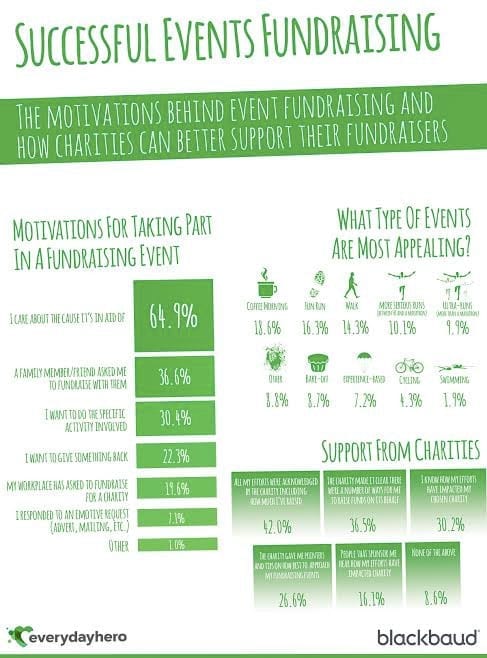Most event fundraisers get no fundraising tips from charities, says Blackbaud
UK charities could do much more to help people who take part in fundraising events for them, according to a Blackbaud survey of more than 1,000 event fundraisers.
The research found that around three quarters of the event participants receive no advice on how best to fundraise; in addition, 58% of them say their fundraising efforts were “not properly acknowledged” by the charity they were fundraising for.
Blackbaud’s Successful Events Fundraising report
The research was commissioned for Blackbaud’s Successful Events Fundraising report, which explores people’s motivations for taking part in event fundraising and at how charities can support them more effectively.
The report reveals how much more some charities could do to boost events fundraising through effective communications. For example:
• 30% of those participating in fundraising events do not hear how their efforts have impacted their chosen charity
• 84% of those that sponsor them are not being informed as to how their donations have helped.

How much more could charities raise from events if they supported their fundraisers more effectively?
What are the most popular fundraising events?
Blackbaud asked event participants what was their favourite kind of event. The most popular was coffee mornings, with 19% saying that these were their preferred event.
The most popular fundraising event for men was a fun run (25%), with a walk the next most popular (19%).
The most popular type of fundraising event for women was the coffee morning (22%).
Advertisement
What motivates fundraising event participants?
Event fundraising participants shared the reasons for which they were most likely to take part in a fundraising event.
• the cause – at 66%, the most popular reason
• a family member or friend asked to fundraise with them – 37%
• the activity itself – 30%
• invitation from employer – 20%
Men were almost twice as likely as women (9.2% to 5.9%) to do a fundraising activity in response to an emotive request.
To pay or not to pay
Many fundraising events charge people to take part, and some require participants to raise a set minimum amount of money.
Most fundraisers (46%) said that they would rather pay no registration fee and fundraise a lot when participating in an event, while 19% said they would rather pay a higher registration fee and not fundraise at all.
John Bird, General Manager, Peer-to-Peer Fundraising, Blackbaud, commented:
“Not for profits need to balance low registration fees in order to attract participants against the risk of participants not actually fundraising. We are noticing that NFPs are increasingly offering two options within registration – a low cost, higher fundraising option and a higher cost, lower fundraising option.”
On the overall findings of the report, he added:
“Millions of people are running, cycling, holding coffee mornings and participating in many other varied events in the name of their favourite causes. But not-for-profits need to support their fundraisers much better than they are currently.
“This means encouraging them, providing direction, sharing tips on how to approach fundraising, thanking them for their effort and following up with those that make a donation. Not only will this raise more money for the cause, but it provides an opportunity to build long-term relationships too.”
Photo: runners and coins by Beeboys on Shutterstock.com



